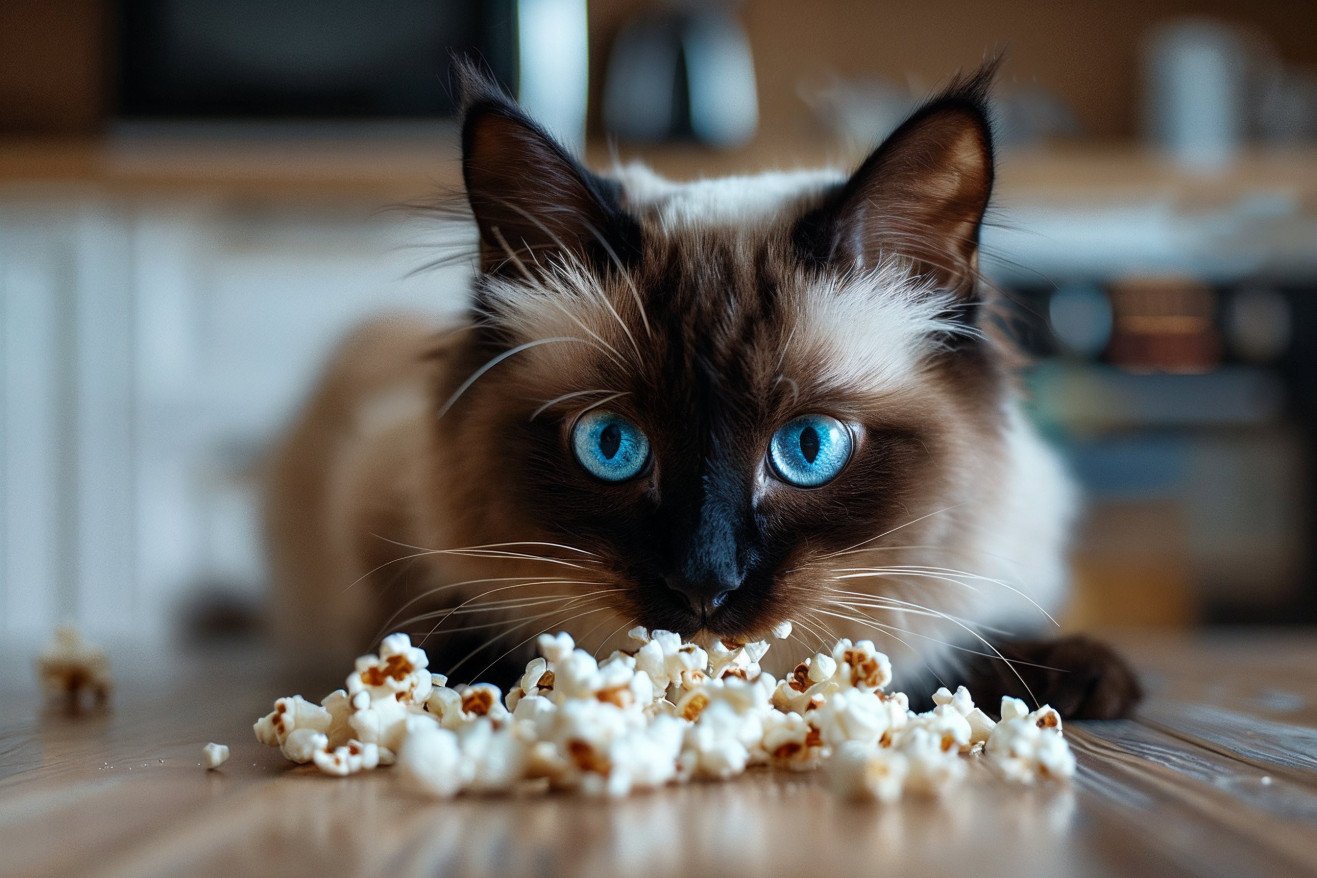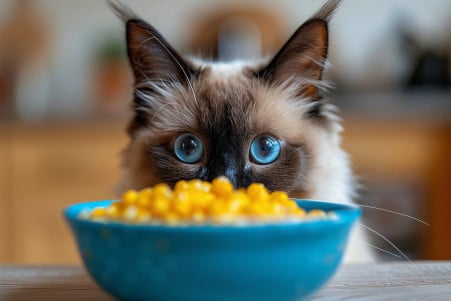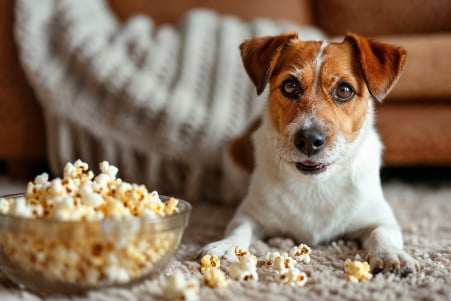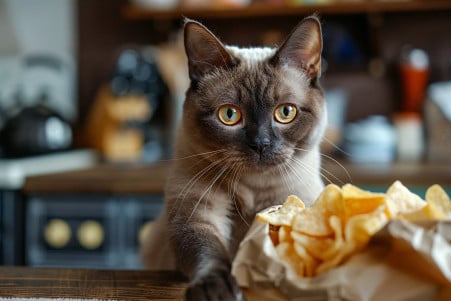Can Cats Eat Popcorn? Here's Why You Should Avoid This Human Snack
20 April 2024 • Updated 19 April 2024

Let's talk about whether popcorn, a popular human snack, is a safe and healthy option for our cats. Popcorn is not safe for cats. Although it's not toxic, popcorn doesn't offer any nutritional benefits to cats and can cause digestive problems like vomiting, diarrhea, and even intestinal blockages if it's eaten in large quantities. Cats are obligate carnivores and need a diet that's made up mostly of animal-based proteins.
While some human foods can be given to cats as an occasional treat in moderation, we'll discuss why popcorn isn't one of them. By reviewing information on a cat's dietary requirements and digestive system from reputable veterinarians, this post will help cat owners understand how to make informed decisions about the human foods they share with their pets.
Can cats eat popcorn?
Nutritional Requirements of Cats and Why Popcorn Is Not a Good Choice
Cats are obligate carnivores, which means they need a diet that consists mainly of animal-based proteins to get the nutrients they need. That's because plant-based foods like popcorn, which is high in carbohydrates, do not contain the essential amino acids, vitamins, and minerals that are essential for cats to thrive and be healthy. While some commercial cat foods include small amounts of corn or other grains, these are not the best sources of nutrition for cats because plant-based proteins are not as easily absorbed by the body.
Popcorn is not nutritious for cats and can lead to weight gain and obesity if it's a regular part of their diet because it's high in carbohydrates. One ounce of air-popped popcorn has 22 grams of carbohydrates, which cats have a hard time digesting. It's important to feed cats a balanced, meat-based diet that's been created to meet their specific nutritional needs because carbohydrates are hard for cats to process and don't provide the same nutritional benefits they do for omnivores like humans. While most cats can eat a piece of popcorn without any negative effects, it shouldn't be a regular part of their diet.
Potential Dangers of Giving Cats Popcorn
According to TrustedHousesitters.com, unpopped or partially popped popcorn kernels can be a choking hazard and cause intestinal blockages if swallowed by cats. Meanwhile, The Dodo reports that butter, salt, and spices can cause digestive upset, including vomiting, diarrhea, and even pancreatitis in cats.
Perfluorooctanoic acid and diacetyl are two chemicals found in the lining of microwave popcorn bags that can be toxic to cats. In addition, the high starch content of popcorn can lead to constipation in cats, which can cause discomfort and other health problems.
Finally, cats can develop allergies or intolerances to the grains in popcorn, which can cause skin problems or digestive upset, according to the TrustedHousesitters.com article. Because of these potential dangers, most experts advise against giving cats popcorn.
What to Do If Your Cat Eats Popcorn
If your cat has eaten a small amount of plain, unbuttered, unsalted popcorn, you should watch for signs of distress or discomfort, including vomiting, diarrhea, lethargy, loss of appetite, and abdominal pain or discomfort, says Genius Litter.
If your cat has eaten popcorn with toppings or seasonings, or if they've eaten a large amount of popcorn, you should call your vet right away. Unpopped kernels are more likely to cause intestinal blockages or choking, so you should seek veterinary care if your cat has eaten them, according to Cats.com.
Your vet may need to induce vomiting or provide supportive care to help your cat pass the popcorn, says Spot®. However, if you stay on the lookout for potential problems and get your cat medical help when they need it, you can ensure that they'll be okay if they eat popcorn.
Healthy Snack Alternatives and Enrichment for Cats
Instead of giving your cat popcorn, you can give them high-quality, meat-based treats that are designed to meet their nutritional needs. Cats.com suggests that you choose treats that are made with simple, protein-packed ingredients like chicken liver, beef, and salmon, and that don’t contain fillers like corn, wheat, and sugar.
Freeze-dried meat treats like Orijen Tundra can be a healthy option that satisfies a cat's natural desire for protein and fat. Soft, chewy treats like American Journey Chicken Recipe can also be a good option, especially for older cats with dental problems. Catnip-filled toys can provide mental stimulation by taking advantage of the catnip's properties.
In addition to treats, environmental enrichment through cat trees, food puzzles, and interactive toys that encourage hunting behaviors can help keep your cat physically and mentally stimulated, according to PreventiveVet.com. Meanwhile, clicker training and nose work can provide cognitive stimulation and strengthen the bond between you and your cat, according to CatSchool.co.
By focusing on meat-based treats and a variety of enrichment options, you can make sure that your cat’s nutritional and mental needs are being met, without the potential dangers of giving them popcorn.
Conclusion: Prioritizing Your Cat's Well-Being
As mentioned in the Wildest article, while popcorn is non-toxic and can have some health benefits for cats in moderation, it should be given to cats sparingly as an occasional treat. The fiber, starches, and antioxidants in popcorn can be good for cats, but the carbs in popcorn can lead to obesity and other health issues in cats. In addition, popcorn kernels are hard and not easily digestible, which can lead to dental issues, gastrointestinal injuries, and digestive upset.
When giving cats popcorn, it's important to avoid any toppings like oils, butter, salt, sugar, or other seasonings that may be unhealthy. Plain, air-popped popcorn is the best option for cats. In addition, cats can choke on whole pieces of popcorn, so it's best to break it into smaller pieces.
In general, popcorn can be a safe occasional treat for cats in moderation, but it should not be a major part of their diet. Instead, cats should get the majority of their nutrition from a complete and balanced cat food that's specially formulated to meet their nutritional needs as obligate carnivores.
By prioritizing your cat's health and well-being, you can ensure they live a happy, fulfilling life while avoiding potential risks from inappropriate human foods like popcorn.


